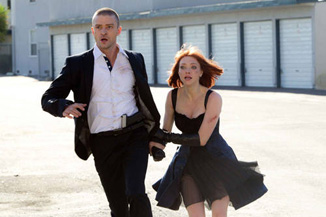Movie Review: In Time
By Matthew Huntley
November 1, 2011
With so much time on his hands, Will has his first taste of opulence, but he’s not able to share it with his mom, who succumbs to time out (in an emotionally effective scene). He makes it his mission to make the rich see, heeding Henry’s message about the equal distribution of time and letting people live freely and without fear. Joining him in his quest is Sylvia (Amanda Seyfried), whose father is an affluent time industrialist. Deep down, she knows her family didn’t get where they are legitimately and she wants to help make things right.
The movie gives itself plenty of opportunities for intelligent dialogue and introspection into its social issues, particularly the gap between the rich and poor, but it doesn’t choose to take them. Instead of letting the opposing characters argue for or against the system, the movie merely divides them into traditional good guys and bad guys. Will and Sylvia are the heroes aiming to rob time banks, distribute the wealth and bring the system down, but have they thought about the consequences? Do they realize what they’re doing is tantamount to having too much money in circulation? Will and Sylvia (and the movie) brush such things aside because they think it’s fair and just, but why doesn’t Niccol’s screenplay have these characters consider the ramifications first? Maybe then the movie would have proved it cares more about promoting thought and deliberation instead of impulsive action. Then again, maybe it doesn’t care at all.
On an action movie level, In Time is competently made, but it’s still only adequate. There are plenty of chase scenes and gun fights, but none of them are innovative enough to be called exciting or original. And for a science fiction movie, it’s light on the kind of details and nuances that would further envelop us in its world. For instance, one question I had was how someone transfers time from themselves to another person or device. If someone asks to borrow five minutes (and they do in this movie), how does someone tell their body to transfer five minutes instead of ten? Is it all psychosomatic? And how does the digital clock work on a physical and mechanical level? Is there a gene that makes it possible? The movie skimps on such minutia that would be interesting to know.
The cast does what it can, but the material limits them to only what the plot requires. There doesn’t seem to be much acting going on and the characters aren’t given weighty personalities. Although to be fair, that may be the point since this is meant to be a dystopian universe where nobody seems happy, even though they’re always doing what they can to survive, which is another irony the movie chooses not to explore.
In Time mostly feels like a wasted opportunity. It has an interesting setup, but once all its pieces are in place, it doesn’t do anything interesting with them. I know the gun fights and chases scenes are what the studio thinks we want to see, but I’d rather have the movie deconstruct its own ideas and really present something to us - perhaps a new argument or, even better, a new solution. It’s clearly meant to be a metaphor for our own society’s problems, and if Niccol wants his movie to get people’s attention and incite change, the first thing people have to do is start talking. Unfortunately, In Time is not the type of movie that gets people talking.
Continued:
1
2
|
|
|
|




